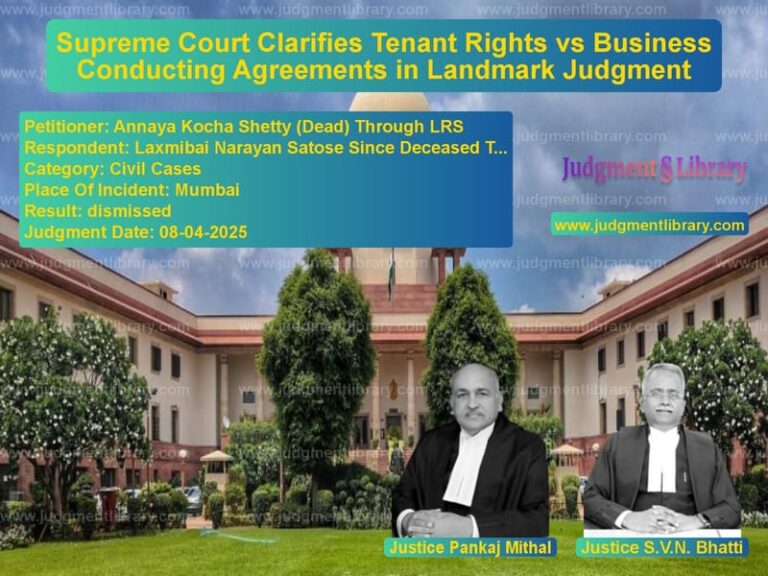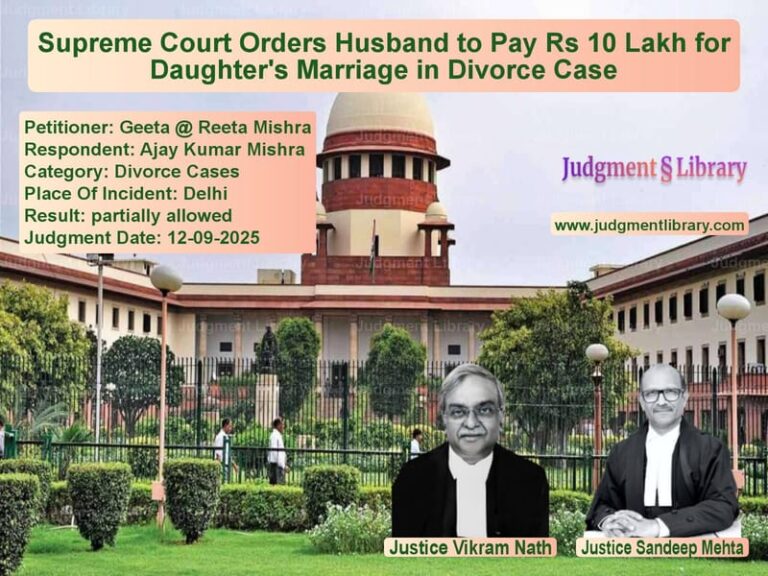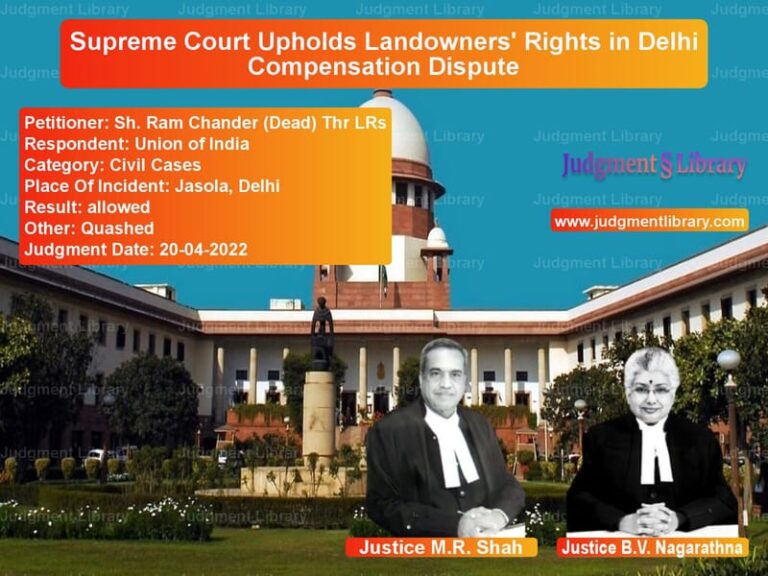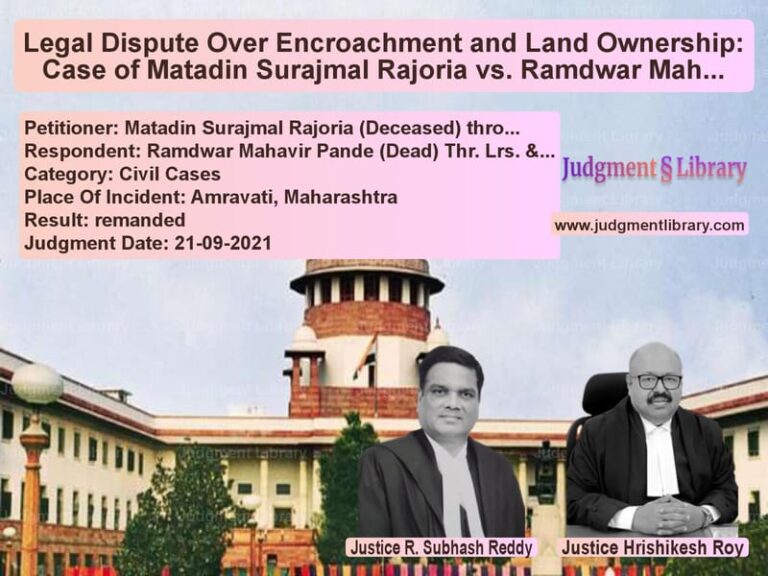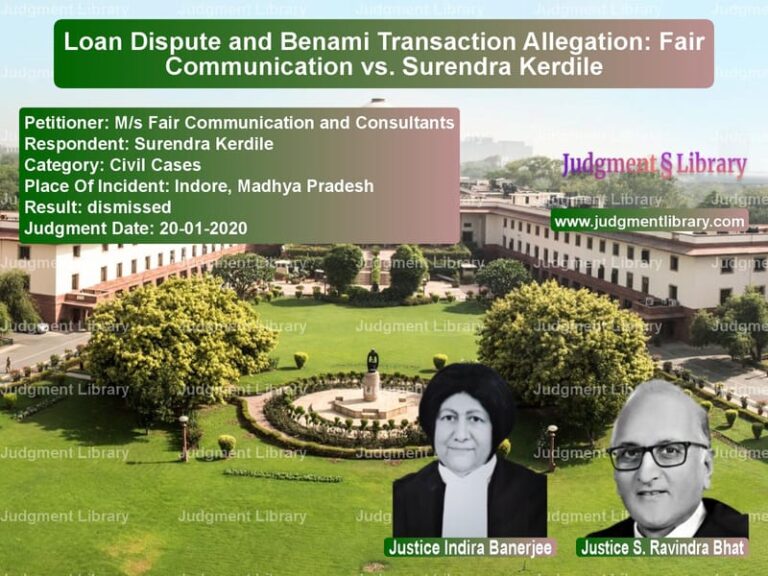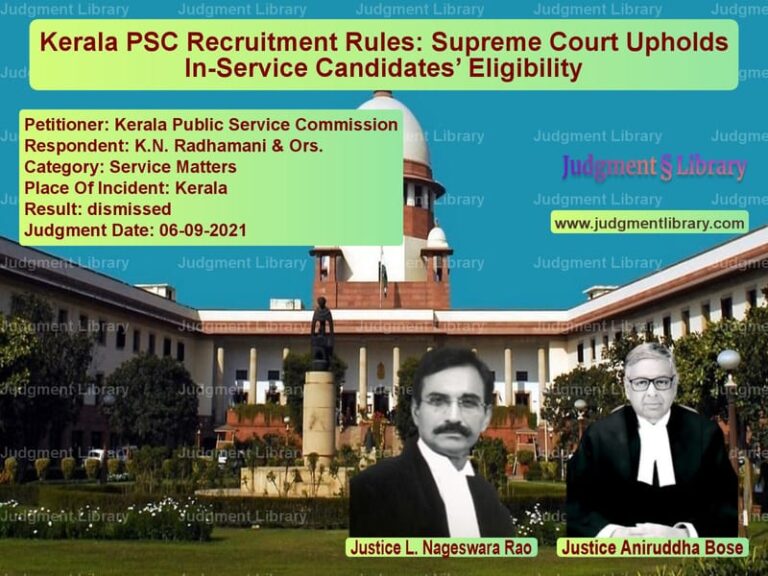Land Allotment Dispute: Supreme Court’s Judgment on Vaibhav Cooperative Housing Society
The case of Vaibhav Cooperative Housing Society Ltd. vs. State of Maharashtra & Ors. revolves around the allotment of government land for a housing society, highlighting issues of eligibility, transparency in land distribution, and the procedural propriety required for such allotments. This judgment, delivered on December 12, 2024, delves into the legal principles that govern the allocation of land and the importance of maintaining fairness in the process of granting land rights.
Background of the Case
The appellant, Vaibhav Cooperative Housing Society Ltd., challenged the decision made by the High Court of Bombay, which dismissed their writ petition and refused to intervene in the land allotment process to the Medinova Regal Cooperative Housing Society (MRCHS). MRCHS had applied for the allotment of a plot of land at Bandra in Mumbai, which was initially granted through a Letter of Intent (LoI) issued in January 2003. However, several issues arose, including changes in the society’s membership and the eligibility of members, which were questioned during the course of the proceedings.
MRCHS had originally applied for the land citing the eligibility of its members, who were mainly employees of the Tata Memorial Centre. However, as the proceedings continued, it became clear that the composition of MRCHS had changed significantly, and many of its members did not meet the eligibility criteria set out by the state for the land allotment.
Arguments of the Petitioner
The appellant, Vaibhav Cooperative Housing Society, presented their arguments, focusing on the procedural irregularities in the allotment process to MRCHS:
- The appellant argued that MRCHS, despite being granted the LoI in January 2003, had failed to meet the eligibility criteria laid down by the government, as several of its members were ineligible due to income limits and other factors.
- The appellant further contended that the changes made to MRCHS’s membership over the years, including the substitution of several members and the resignation of others, had led to a situation where no members from the original list could be considered eligible.
- Additionally, the appellant pointed out that MRCHS had not adhered to the mandatory requirement of providing complete details of its members, including their income details, as mandated by the Land Revenue (Disposal of Government Land) Rules, Maharashtra, 1971.
Arguments of the Respondent
The respondent, the State of Maharashtra, defended the allotment made to MRCHS by presenting the following arguments:
- The state emphasized that MRCHS had followed all the required procedures, including submitting the necessary documents and fulfilling the initial membership criteria when the LoI was issued.
- The state also highlighted the ongoing scrutiny of MRCHS’s membership, and argued that the society had made genuine attempts to comply with the rules, despite the issues that had emerged later.
- The respondent contended that, even though some members were ineligible, the society had been granted a legitimate opportunity to rectify these issues and ensure that the necessary qualifications were met for all members.
Supreme Court’s Analysis
The Supreme Court, after reviewing the arguments presented by both parties, examined several key factors:
- The Court noted the numerous changes in the membership of MRCHS over time and the failure of the society to provide adequate details of its members, which directly violated the government’s rules for allotment of land.
- It also took into account the fact that the main objective behind allotting the land to MRCHS was to provide housing to employees of Tata Memorial Hospital, but this objective was not fulfilled, as many members of the society were not even associated with the hospital anymore.
- The Court also examined the procedural aspect of the land allotment process, highlighting that the government had not adhered to the prescribed rules for transparency and eligibility checks, and had failed to disclose reasons for granting the land to MRCHS.
Final Judgment
The Supreme Court ruled in favor of the appellant, Vaibhav Cooperative Housing Society Ltd. The Court held that:
- The allotment of land to MRCHS was done arbitrarily and in violation of the prescribed procedures for land allotment. The changes in the membership of MRCHS and the failure to meet eligibility criteria meant that the original purpose for which the land was allotted had not been satisfied.
- The Letter of Allotment issued in favor of MRCHS was quashed, and the Court ordered that the land should not be allocated to MRCHS in the manner it was.
- The Court emphasized the importance of transparency in the land allotment process, and directed the concerned authorities to reconsider the allotment in accordance with the rules and regulations, including public scrutiny and eligibility checks.
The Supreme Court’s decision highlighted the importance of following legal procedures and maintaining transparency in government land allotments. The ruling underscored the need for strict compliance with eligibility requirements and ensured that land is allotted only to those who meet the criteria set by the government.
Petitioner Name: Vaibhav Cooperative Housing Society Ltd..Respondent Name: State of Maharashtra & Ors..Judgment By: Justice Sudhanshu Dhulia, Justice Ahsanuddin Amanullah.Place Of Incident: Maharashtra.Judgment Date: 11-12-2024.
Don’t miss out on the full details! Download the complete judgment in PDF format below and gain valuable insights instantly!
Download Judgment: vaibhav-cooperative-vs-state-of-maharashtra-supreme-court-of-india-judgment-dated-11-12-2024.pdf
Directly Download Judgment: Directly download this Judgment
See all petitions in Contract Disputes
See all petitions in Property Disputes
See all petitions in Landlord-Tenant Disputes
See all petitions in Judgment by Sudhanshu Dhulia
See all petitions in Judgment by Ahsanuddin Amanullah
See all petitions in allowed
See all petitions in Modified
See all petitions in supreme court of India judgments December 2024
See all petitions in 2024 judgments
See all posts in Civil Cases Category
See all allowed petitions in Civil Cases Category
See all Dismissed petitions in Civil Cases Category
See all partially allowed petitions in Civil Cases Category


